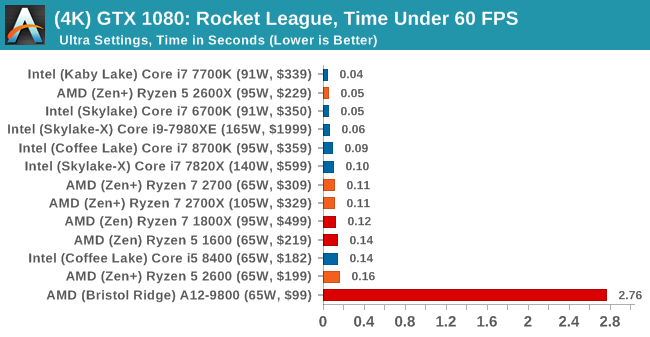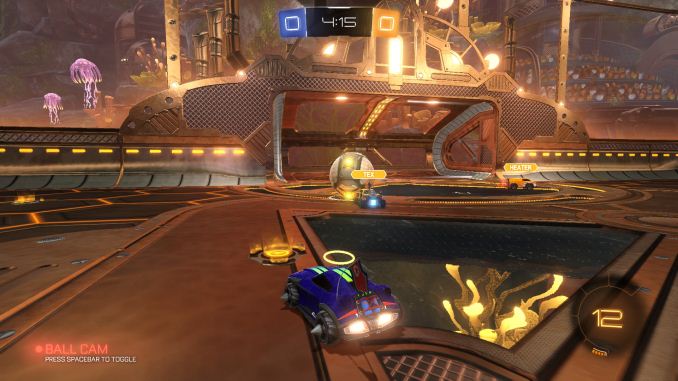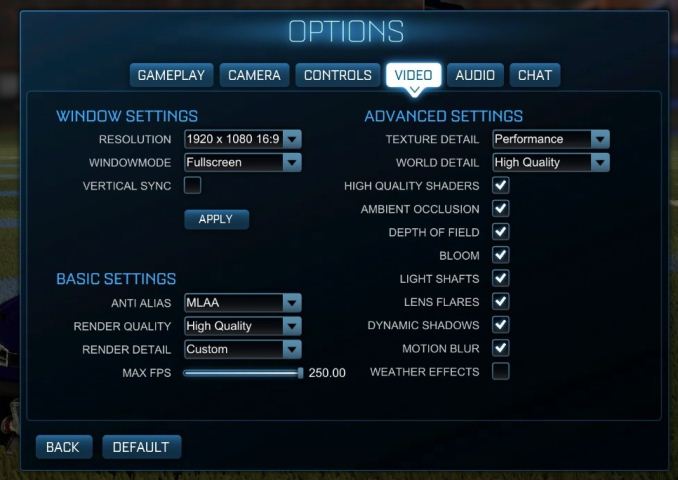The AMD 2nd Gen Ryzen Deep Dive: The 2700X, 2700, 2600X, and 2600 Tested
by Ian Cutress on April 19, 2018 9:00 AM ESTRocket League
Hilariously simple pick-up-and-play games are great fun. I'm a massive fan of the Katamari franchise for that reason — passing start on a controller and rolling around, picking up things to get bigger, is extremely simple. Until we get a PC version of Katamari that I can benchmark, we'll focus on Rocket League.
Rocket League combines the elements of pick-up-and-play, allowing users to jump into a game with other people (or bots) to play football with cars with zero rules. The title is built on Unreal Engine 3, which is somewhat old at this point, but it allows users to run the game on super-low-end systems while still taxing the big ones. Since the release in 2015, it has sold over 5 million copies and seems to be a fixture at LANs and game shows. Users who train get very serious, playing in teams and leagues with very few settings to configure, and everyone is on the same level. Rocket League is quickly becoming one of the favored titles for e-sports tournaments, especially when e-sports contests can be viewed directly from the game interface.
Based on these factors, plus the fact that it is an extremely fun title to load and play, we set out to find the best way to benchmark it. Unfortunately for the most part automatic benchmark modes for games are few and far between. Partly because of this, but also on the basis that it is built on the Unreal 3 engine, Rocket League does not have a benchmark mode. In this case, we have to develop a consistent run and record the frame rate.
Read our initial analysis on our Rocket League benchmark on low-end graphics here.
With Rocket League, there is no benchmark mode, so we have to perform a series of automated actions, similar to a racing game having a fixed number of laps. We take the following approach: Using Fraps to record the time taken to show each frame (and the overall frame rates), we use an automation tool to set up a consistent no-bot match on easy, with the system applying a series of inputs throughout the run, such as switching camera angles and driving around.
It turns out that this method is nicely indicative of a real match, driving up walls, boosting and even putting in the odd assist, save and/or goal, as weird as that sounds for an automated set of commands. To maintain consistency, the commands we apply are not random but time-fixed, and we also keep the map the same (Aquadome, known to be a tough map for GPUs due to water/transparency) and the car customization constant. We start recording just after a match starts, and record for 4 minutes of game time (think 5 laps of a DIRT: Rally benchmark), with average frame rates, 99th percentile and frame times all provided.
The graphics settings for Rocket League come in four broad, generic settings: Low, Medium, High and High FXAA. There are advanced settings in place for shadows and details; however, for these tests, we keep to the generic settings. For both 1920x1080 and 4K resolutions, we test at the High preset with an unlimited frame cap.
All of our benchmark results can also be found in our benchmark engine, Bench.
MSI GTX 1080 Gaming 8G Performance
1080p



4K
















545 Comments
View All Comments
ACE76 - Thursday, April 19, 2018 - link
AMD is going to unleash some serious tech next year with Ryzen 2 on 7nm...this is just a refresh of the original Ryzen...the real deal will be next April/May...Intel is in for a rough ride.tmiller02 - Thursday, April 19, 2018 - link
the patches are the difference.. which everyone should do on intel machines.. the fact is they came with a performance hit! AMD is now leading the pack... security over performance any day!Dr. Swag - Thursday, April 19, 2018 - link
I've seen other sites do their tests with the patches. I'm just not certain if they went back and rested older cpus or not...Lolimaster - Thursday, April 19, 2018 - link
You can be sure most didn't.fallaha56 - Thursday, April 19, 2018 - link
Most didn’t patchLook at techradar who did -they too are showing massive losses for Intel
Luckz - Monday, April 23, 2018 - link
Techradar's review is some form of manipulation. They don't even show the test system specs for the comparison scores. In their 8700K review they wrote the CPU hit 76° for them at stock and 87° OC; in the 2700X review they wrote that the 8700K only went up to 52°(!!!). That CPU literally had its handbrake™ pulled.Ranger1065 - Thursday, April 19, 2018 - link
Thank you for an informative and timely review.T1beriu - Thursday, April 19, 2018 - link
What workload was used during per core power consumption tables?Ian Cutress - Thursday, April 19, 2018 - link
Prime95Luckz - Monday, April 23, 2018 - link
Assuming that means the non-AVX version, with that tool it makes sense to clarify.